#danganronpa analysis
Text
Kyoko giving Byakuya her room key because the group doesn't trust her...Makoto being given the knife because the group trusts him...The whole fifth trial where Kyoko not having her room key and Makoto having the knife are core pieces of evidence, and it's Makoto's trust for Kyoko that decides which of them faces execution...
Kyoko not having her room key and therefore avoiding suspicion is a reward for being distrusted, and Makoto having the knife and therefore being placed under suspicion is a punishment for being trusted. Byakuya and Kyoko both having their relationships with trust challenged in the trial and the aftermath, while Makoto's relationship with trust is interrogated wholesale.
(The messy polyamory of it all!)
#danganronpa#makoto naegi#kyoko kirigiri#byakuya togami#naegamigiri#tonaegiri#togiri#naegami#naegiri#danganronpa analysis
246 notes
·
View notes
Text
About Brainwashing in Danganronpa
Hello to all 3 of the people who see this account. A few months ago, I made a thread on hit website Twitter dot com about brainwashing in the Danganronpa Series. I discussed where it came from, how it works, and how the brainwashing of class 77-B was never a retcon. The thread got a lot of attention there, even getting a "debunk" on other hit website Reddit dot com (lmao). Due to that, there's been a lot of responses and questions. Since I can't really update a Twitter thread, I decided that I'd make the Ultimate™ Brainwashing thread and hopefully dispel any information on the subject while making my original points more clear and covering things I failed to cover.
So here it is: Brainwashing in Danganronpa, how it works, where it came from, and how it was intended from the start. (a 🧵 except not really)
*Massive spoilers for Danganronpa Zero, Danganronpa 2, Danganronpa Another Episode, Danganronpa Togami, and Danganronpa 3, as well as the series as a whole*
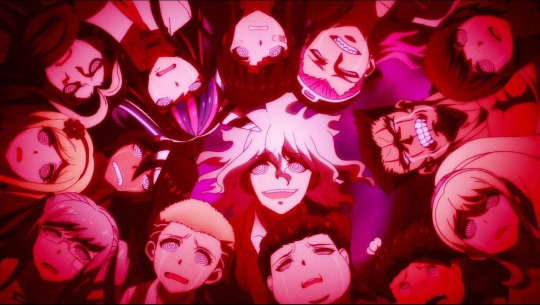
Danganronpa Zero: First Sighting
Brainwashing has its roots all the way back in the second official entry produced in the series, Danganronpa Zero.
During the story's events, Ryoko comes across a secret cult made up of students from the reserve course. They're seen staring at a strange video, seemingly turning them and turn them into mindless zombies.
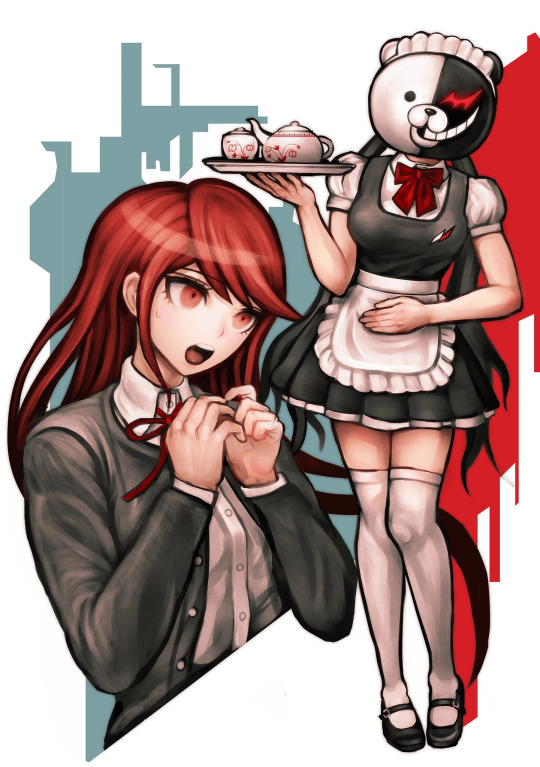

The video depicts members of the student council killing each other. Ryoko is stunned while watching it. She can barely look away, but eventually through force of will she does. This same video is later used to convince the reserve course to rebel.


The way it's described to work is that it uses their “pent-up emotions,” implying that their emotions played a role in its effectiveness. It's also worth noting that the novel itself refers to what is happening as brainwashing, making this objectively the first depiction of brainwashing in the series right from the second entry.
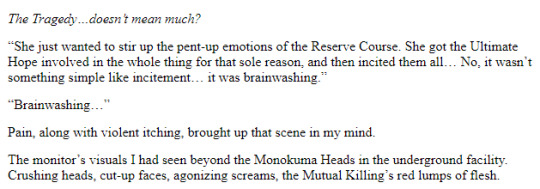
Danganronpa 2: Now it Gets Dubious
Our next instance of brainwashing comes from Danganronpa 2. The concept is brought up multiple times, such as when Makoto states that the Ultimate Despairs were brainwashed or how the Neo World Program is good at treating brainwashing, though the details of what brainwashing actually means in this context are kept vague.
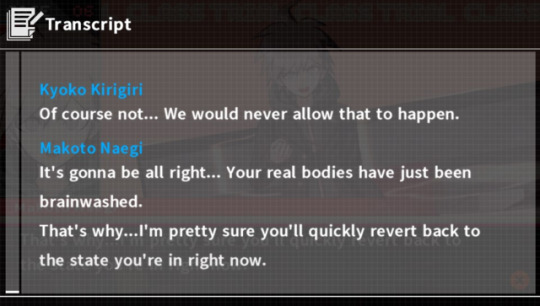
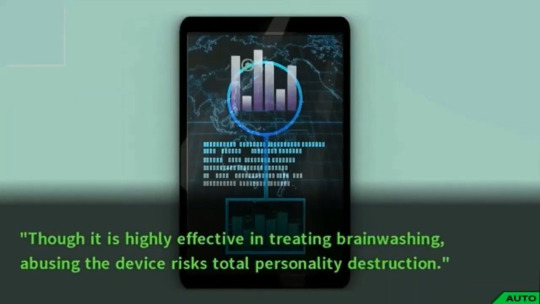
It's also worth noting that Danganronpa 2 was being written around the same time as Danganronpa Zero and Kodaka wanted concepts from the novel to appear in Danganronpa 2, likely so readers would feel validated. This is why things like Izuru Kamukura and the reserve course play huge roles in Danganronpa 2, it's not too much of a stretch to say that the same applies with brainwashing.
One detail we’re given about the brainwashing is from Monokuma, who states the Ultimate Despairs were brainwashed by Junko taking advantage of their feelings. Specifically love, hate, grudges, and "anything really". If that sounds familiar, it’s because that’s exactly how the brainwashing video from Danganronpa Zero was described to function, using their pent-up emotions.
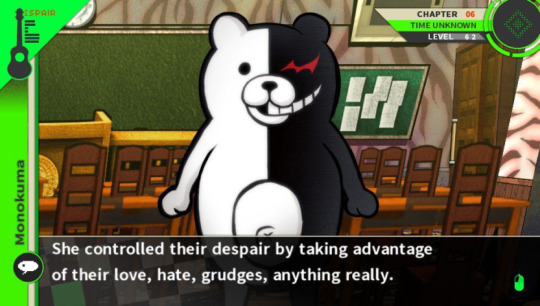
I should mention that Monokuma and Junko are known for being unreliable narrators who often stretch the truth, exaggerate things, and use hyperbole to manipulate people into believing their narrative. Monokuma describes the Ultimate Despairs as “nothing more than Junko’s limbs”, which contradicts the existence of characters like Nagito. Who, while in his despair state, did not work with Junko nor did he look up to her (at least in the normal sense like the other Ultimate Despairs).
In fact, it would have been impossible for them to really obey any of Junko's orders as Ultimate Despairs because Junko was trapped inside of Hope's Peak with minimal connection to the outside world. This isn't a definitive "Monokuma is lying" statement, but just note that his word isn't 100% reliable. Meanwhile, someone like Makoto who outright mentions brainwashing, is a much more reliable source.
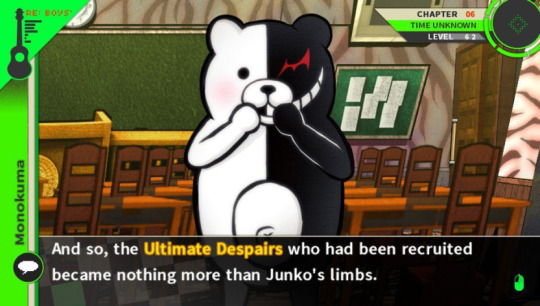
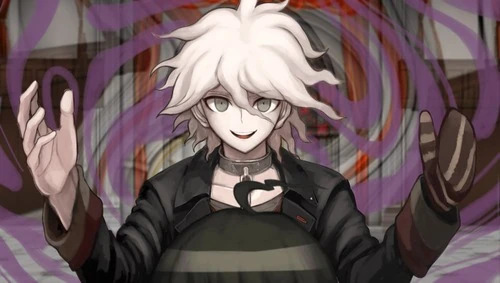
Danganronpa Another Episode: More Brainwashing! (kinda irrelevant tho...)
The next time brainwashing is used is in the next entry, Danganronpa Another Episode. Though its purpose in this discussion isn’t the most useful, as the brainwashing is caused by Monokuma helmets, which don’t have their functionality explained. I figured it was worth mentioning and describing at least, as its another example of brainwashing at least.
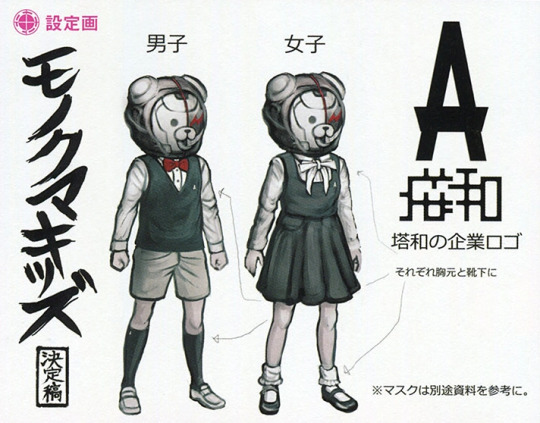
I did figure it was worth adding how the brainwashed children act. They obey the Warriors of Hope’s every command, as if they have zero control over their actions. This is different from how the Ultimate Despairs act, who still some free had free will after presumably being brainwashed judging by the actions of Nagito, who is also in this game.
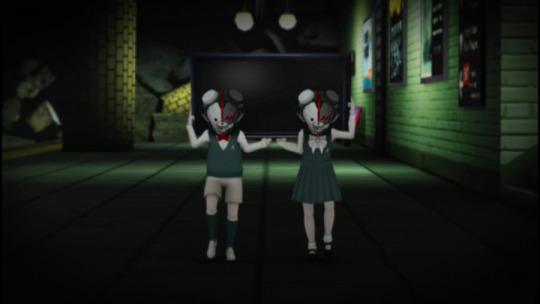
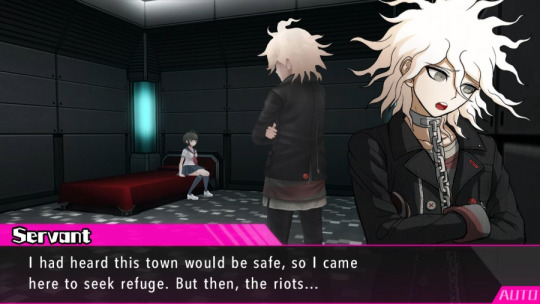
Danganronpa Togami: I Hate My Life
Okay. As mixed as my opinions are on this novel trilogy, it does feature brainwashing. In fact, it might feature one of the most detailed and important descriptions of brainwashing in the series, and even outright CONFIRMS that class 77-B were brainwashed (sorta).
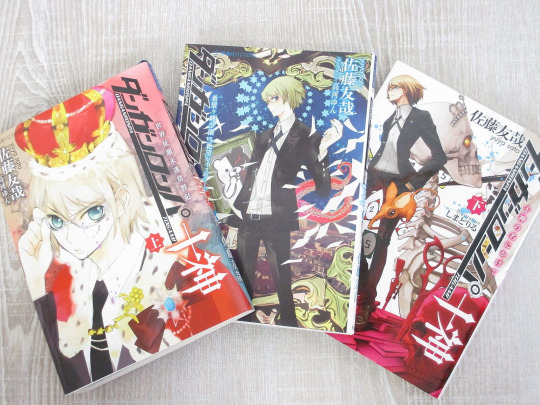
"Hey um... Tumblr/Twitter user Pengu... what do you mean by 'sorta'?"
Well my uninformed reader who I guarantee has probably never read this book, there's a twist. I regret to inform you that the canonicity of Danganronpa Togami is rather questionable, as it depicts an extremely unreliable narrator’s warped viewing of events due to this thing called the K2K system, which means not everything in the novel is meant to be taken literally or at face value.
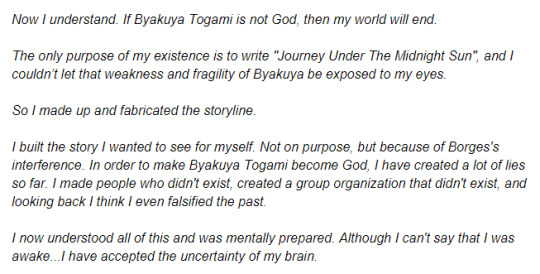
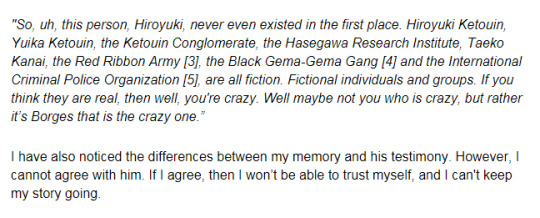
This doesn't mean that everything should be discarded or immediately dismissed however. This just means that we have to use our brains a little and decipher what the hell Yuya Sato was cooking when he wrote this novel trilogy.
In the novel, we discover the existence of the elusive despair novel. When read, the novel will turn the reader to despair and inflict them with the despair disease. This novel is what's used to plummet the world into despair, as well as being what caused the class 77-B to become the Ultimate Despairs. There's no known ways to avoid it, once you read it, it's joever. 😔

As I said earlier, the events of Danganronpa Togami can’t be taken literally. Due to this and prior context, we can safely assume that the despair novel is most likely the K2K's warped idea of the despair video from Danganronpa Zero. Instead of being a book being read that brainwashed people, it was a video being watched. What makes me so sure? Well let's look over the similarities.
The way the despair novel works is that it uses cruel words to overload the reader with negative emotions, causing them to snap and turn to despair. That sounds almost exactly like the despair video, overloading the viewer by manipulating their emotions until they turn to despair.
This connection's a little bit of a stretch but I'll bring it up anyways. The technology used in the despair novels was originally to bring hope. (Take notes, it will probably be important assuming you buy this connection.)

Essentially, the despair novel works the exact same way as the despair video, but instead it’s a book and you read it instead of watching it. This means that class 77-B and the rest of the world were most likely brainwashed via the despair video, and that is what caused the class to become Ultimate Despairs.
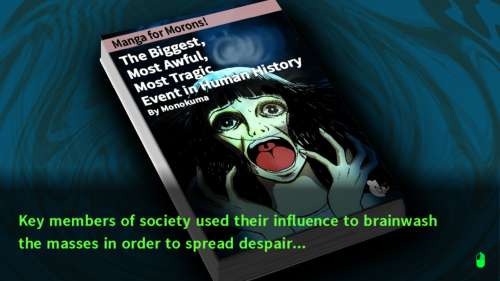
Danganronpa 3: The One People Really Don't Like
And all of this brings us to the most detailed yet controversial usage of brainwashing: Danganronpa 3. Many assume that the anime’s usage of brainwashing is a retcon, contradicting the words of our holy savior Super Danganronpa 2: Goodbye Despair High School. However, I’d like to debate that. In fact, I'd like to finally put a nail in the coffin of this really stupid debate and finally show you that Danganronpa 3's depiction of brainwashing is exactly how it has always been described.
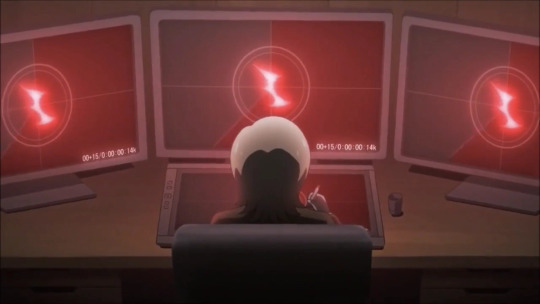
In Danganronpa 3, we are introduced to Ryota Mitarai and his anime. Using the power of subliminal messaging, it heightens the viewer's emotions and makes them more powerful. What was once a slightly emotional scene is now a complete tearjerker fully capable of tearing at the viewers heart strings!
While he acknowledges that there are unethical things that can be done with this technology and it's technically brainwashing, his goal is to use this technology to make the world a better place, even if it can be dangerous. If that sounds familiar, that's because it's what Hope's Peak tried doing with the despair novel in Danganronpa Togami. Though I'll admit, this single point is a little bit of a stretch as there are differences. I just figured it was worth at least a mention.
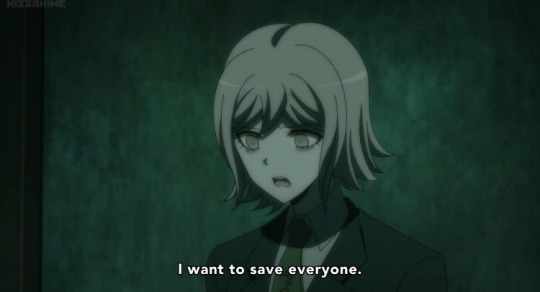
Using her analytical prowess, Junko gets a rough understanding of how the technology works, so she develops the despair video, featuring the student council killing each other overlayed with subliminal messaging technology to make the despair felt while viewing the video stronger.
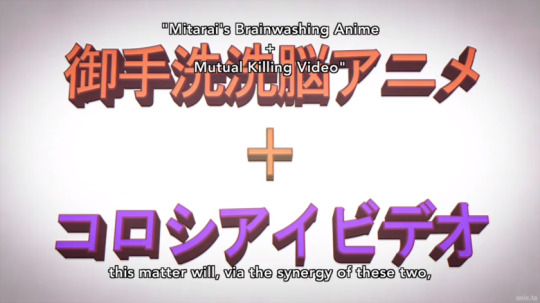
The video works on Mikan, however Junko fears that the video may not be powerful enough to fully go through with her plans due to not understanding the technology nearly as well as Ryota does. Because of this, she forces Ryota to create a better, more powerful despair video. A despair video v2 if you will.
Junko’s fears weren’t unfounded, as we discover that Chisa had the mental fortitude to resist the despair video, similarly to how Ryoko was able to resist the same video in Danganronpa Zero. This is exactly why Junko needs a more powerful video, one that she knows can’t be resisted.
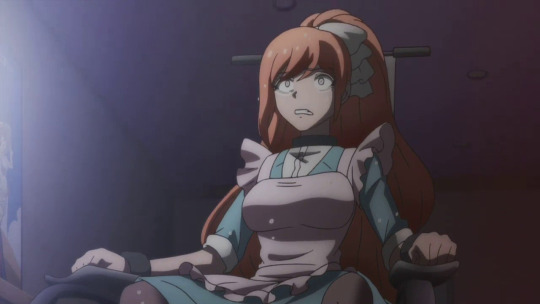
"Ermmmm, Tumblr/Twitter user Pengu, how come Ryoko and Chisa are able to resist the despair video but Mikan and nobody in the reserve course could?"
Good question, the answer is pretty simple. As mentioned before, the video takes advantage of the emotions of the viewer. Mikan is already pretty weak minded, so there wasn't much issue in controlling her. The reserve course already hated Hope's Peak and would take any reason to hate them more, so a video that shows them the sins of Hope's Peak would affect them as well.
Ryoko and Chisa have no connection to the reserve course however, and neither are particularly very weak emotionally. Ryoko has the analytical prowess of Junko and Chisa is just a very strong willed person in general, and paired with Junko's lack of knowledge about subliminal messaging when creating the video, it's pretty obvious it wouldn't be that effective on them. All the more reason for Junko to force Ryota to make a better despair video.
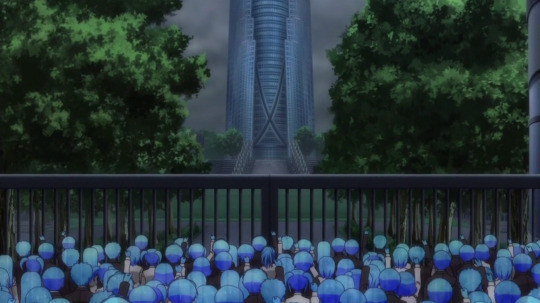
The despair video v2 that Ryota is forced to make comes in the form of Chiaki’s execution video, where the stronger subliminal messages paired with witnessing the representation of the happiest moments in their miserable lives and their closest friend suffer makes class 77-B unable to resist. Ultimately this causes them to finally snap, being overloaded with despair, and now they turn into the Ultimate Despairs.
(side note this is so freaking cool idc what anyone else says)
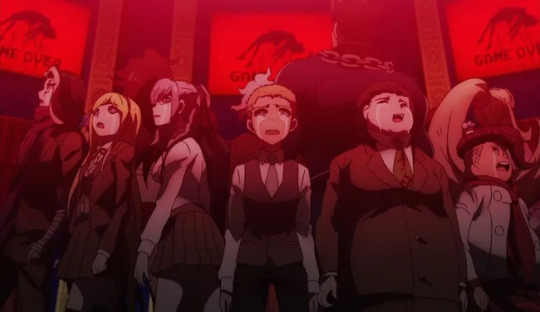
This resembles Monokuma’s explanation from Danganronpa 2. Junko used class 77-B’s emotions and years of getting closer against them to turn them to them to despair. Now featuring the added context of her using the video designed to manipulate people’s emotions.
This depiction of brainwashing fits perfectly with the information provided throughout the series, even down to the little details. It’s so close in fact that I can say without a doubt that Danganronpa 3 did not retcon anything.
“But Tumblr/Twitter user Pengu, that isn’t how the video is shown to work during Hope Arc. Therefore it actually contradicts previous entries and is inconsistent!"
To that I say, you’re correct! ...at least about the hope video functioning differently, but that doesn’t make it inconsistent.
The hope video behaves pretty differently. Instead of overloading the viewer with negative feelings, it simply just shows them a repeating video loop that turns them into a mindless zombie, likely caused by even stronger subliminal messaging. The people affected can also snap out of this state with some time, as seen with Aoi.
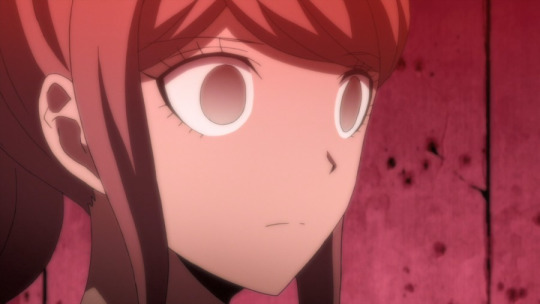
The reasoning for this is actually pretty simple, it’s just different technology entirely. It’s stated that the hope video was developed later on after the despair video. If anything, it behaves very similar to the Monokuma masks from Danganronpa Another Episode, which we also already established uses different technology.
The hope video doesn’t contradict the despair video at all because they both use completely different tech. This can also be seen with how the despair video uses subliminal messaging, meanwhile the messaging in the hope video couldn’t be further from subliminal. There is no inconsistency, just two different things.
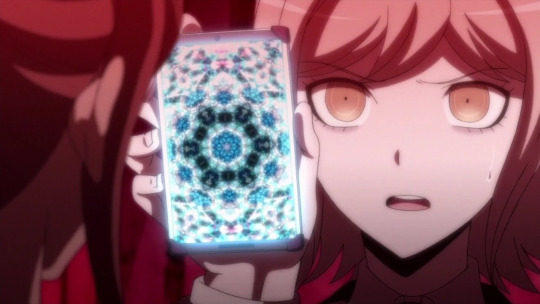
The reason the hope video needed to be broadcasted everywhere was so that since it would be airing everywhere, nobody would have time for the effects to wear off or resist it. This would turn the world into mindless zombies who obey every command, similarly to the Monokuma kids. It's just that now they don't have to force bulky helmets onto everyone.
Debunking Common Arguments
With the hope video out of the way, I think it’s very safe to assume that not only is the despair video’s functionality very accurate to previous descriptions, it’s also always been the reason for the brainwashing of Class 77-B, long before Danganronpa 3. Even if you disagree and think the cause of brainwashing was never explicitly mentioned in Danganronpa 2, there's still the fact that Danganronpa 2 outright says it was brainwashing. So even if a video wasn't the direct cause of it, them being brainwashed was still always intended (though given the context, I'm certain that the video was always the culprit).
Many point to this line where Kazuichi asks why they became the Ultimate Despairs and Makoto says he never got an answer to debunk this. But... this doesn't change anything. He asks why they became Ultimate Despairs, not how. And this is completely ignoring the fact that Makoto clearly has done his own digging into the situation, he discovered the Remnants of Despair were hiding among Future Foundation after all. The Future Foundation had access to brainwashing videos, they found them, so of course Makoto is going to know about the brainwashing. But that's not what he's asking about, he's asking about the why. That's what he doesn't know.
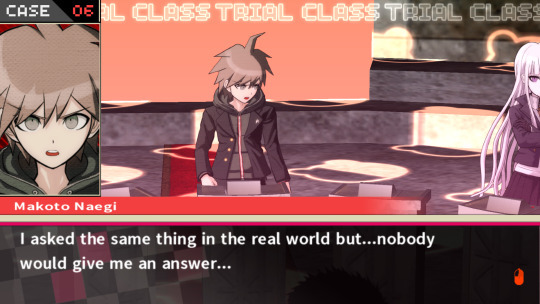
Many also point to Mikan stating that it was her many human relationships that led her to being the way she is. Once again, this changes literally nothing. Mikan was the only one of the remnants who actually knew Junko, she was the only one who spent time with her because she was the first subject. This is why she gets more attached to her, and even why she'd believe what Junko would tell her when they spent time together.
Monokuma also says that Junko used "hopeless methods overflowing with charisma and humor" to control the masses. I don't even know why I have to address this, but this statement is so vague you can interpret it as a million things. Like for example, this is how she got Ryota to work for her.
While pretending to be Makoto to manipulate the people in the trial, Junko tells them that they all became Ultimate Despairs while coming into contact with her at Hope's Peak and they were subjected by her terrifying influence. Again, ignoring how vague "terrifying influence" is, this is literally Junko trying to LIE AND MANIPULATE them. This is quite possibly the worst example you could have used because we know for a fact that she is lying to them while pretending to be Makoto.
There's other examples of Junko trying to manipulate them, like mentioning how everyone hated them and their all Ultimate Despairs at the end of the day. But that's just what this is, manipulation. You would think that the "Junko manipulated class 77-B" crowd would understand that saying "everyone hates you but I saw your potential" is literally manipulation 101.
Some say that the brainwashing turned them into mindless zombies and eliminates all blame from their actions. While I would agree that it does make them less at fault, they still have the ability to make choices and still have free will. Their original personalities haven't been overwritten, their brains were just rewired to crave despair. They're still each their individual person with their own ways of feeling despair, and characters like Chisa and Nagito show that they regain their free will to an extent.
Conclusion and Final Thoughts
This whole debate stems from people misunderstanding Monokuma’s words and going along with the popular interpretation, which turned out to be wrong. Whether you like the use of brainwashing or not, it objectively isn’t a retcon as it's been developed ever since Danganronpa Zero.
Personally, I love the use of brainwashing. I think the way it's developed throughout the series and its usage in Danganronpa 3 is super interesting. If you disagree, that's fine! Heck, if you choose to headcanon that Junko manipulated 15 individual teenagers into all becoming despair hungry terrorists capable but ending the world and fighting off every military in the world in less than a year, that's cool too! But the truth is, Danganronpa 3's brainwashing is canon and it's also not a retcon nor does it contradict anything.
Contrary to popular belief, Kodaka was involved with the writing of the anime. He provided a large draft and outline of the plot and oversaw its development. He produced the anime, he did his homework, he knew what he was doing. I'm sure if Kodaka intended for them to all be manipulated one by one, that's what he would have went with.
All information implying that it was manipulation is very few and far between and questionable at best, not to mention outweighed by everything implying it was brainwashing. Mind manipulation stuff is not new in this series, its been around since the first game and brainwashing was established in literally the second entry ever produced.
Whether you love it or hate it, think it's the best thing since sliced bread or the death of the series, brainwashing was the answer the whole time. Some people just never noticed it, and instead of acknowledging that they were wrong, they stuck with a headcanon that they believed so much and jumped to the conclusion of "retcon". I hope this mega post managed to inform some people, maybe change some minds too. If you still don't buy it, then I guess there's nothing I can do. Thanks for reading all of this though, I tend to yap a lot about this franchise lmao.
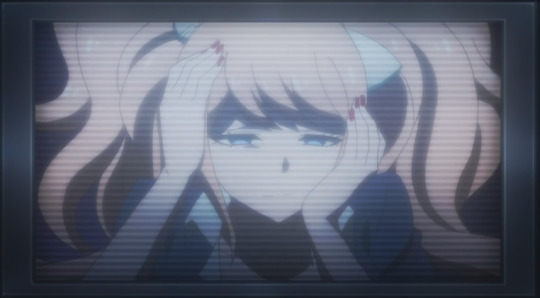
#danganronpa#danganronpa 2#danganronpa zero#danganronpa 3#dr0#dr3#dr3 anime#danganronpa goodbye despair#danganronpa 3 despair arc#dr2 goodbye despair#super danganronpa 2#danganronpa anime#sdr2#danganronpa another episode#danganronpa ultra despair girls#udg#danganronpa togami#danganronpa analysis#ultimate despair#remnants of despair#junko enoshima#ryoko otonashi#chisa yukizome#ryota mitarai
131 notes
·
View notes
Text
junko exposing the existence of izuru kamukura is so fire like she really did that props to her for exposing human experimentation
all jokes aside people dont understand that junko didnt even do much to cause the tragedy other that move a few key pieces into place
and thats what makes her such a terrifying villain
the system within the danganronpa universe (and arguably our own) places talent above all else— above humanity. personhood itself lies in abilities you either have or you dont
in many ways all junko did was shine a light. it demonstrates how people gain power by profiting off of instability. its actually really easy to see how junko couldve become a hero to so many, to the cast of sdr2, to the warriors of hope, to mukuro
danganronpa isnt about “brainwashing video haahhahaha” its about… SOCIETY… and how institutions profit off of a population thats in the dark, how that lack of transparency can be exploited by someone
it sets a horrifying atmosphere and i think that was the actual intent behind her character when they were writing thh sdr2 and dr 0
#danganronpa#junko enoshima#drthh#sdr2#dr0#HER CHARACTER IS SO INTERESTING#i feel like the joker writing this#danganronpa analysis#another post where i ignore dr3#it does not exist to me
121 notes
·
View notes
Text
Something I think about a lot is how in the anime before Mondo’s execution, Taka was screaming take me instead.
As ishimondo shippers we put a lot of focus on this, that Taka was willing to die so Mondo could live. That Taka would rather die than live without him.
But we never really talk about how Mondo wouldn’t do the same. If he didn’t get found guilty then all the others would die, including Taka.
This is something Mondo definitely felt horrible about, he didn’t want this to happen, but he still didn’t do the right thing and confess to save the others.
It’s hard to blame him for this, he was afraid, he was afraid of dying. But Taka wasn’t, Taka was willing to give everything to save Mondo even after knowing everything Mondo did.
And I think that tore Mondo up inside. I think that might have even been worse than the execution. Once again he has someone willing to die to protect him out of pure selfless love. Love Mondo thinks he doesn’t deserve.
At the end of that trial Mondo was forced to contend with the fact that Taka was right when they argued earlier, he is a coward. And that didn’t change just because Taka fell in love with him.
#angst angst angst#danganronpa#kiyotaka ishimaru#trigger happy havoc#ishimondo#mondo owada#character analysis#danganronpa analysis#my post
209 notes
·
View notes
Text

I made a diagram of Sayaka's facial expressions. Also drew the beauty of Maizono
#Sumechiart#Danganronpa#danganronpa fanart#Sayaka#sayaka maizono#danganronpa trigger happy havoc#danganronpa analysis#Somewhat
100 notes
·
View notes
Text
a thing i really love about drv3 is that the protag and antag aren't the actual parallels.
in dr2, the similarities to nagito and hajime are abundant. They are clearly meant to mirror each other in the way nagito is obsessed with hope and the other ultimates while hajime wants to be hope and wants to be an ultimate.
in drv3, kokichi and kaito are direct parallels to each other as opposed to kokichi and shuichi. In the way kaito outwardly supports the rest of them, kokichi outwardly works to "bring them apart,". In their own ways, they are attempting to end the killing, they are the ones keeping the group together.
kokichi wants to be chased, kaito chases. kaito wants a challenge, kokichi gives it to him.
in the way nagito loves the hope in hajime, kaito says, "It's like, even though we're rivals, our hearts are one." in his love hotel event.
does any of that make sense?
#danganronpa kokichi#danganronpa kaito#danganronpa#danganronpa v3#danganronpa analysis#danganronpa oumota#kaito momota#kokichi ouma#lemonrants
35 notes
·
View notes
Text
I MIGHT just have figured out why Kokichi outed Gonta in Ch 4
I was on some japanese translation blog and Kokichi states even he doesn't know who the true mastermind is, which isn't so surprising.
Anyway as I read that I thought, if he doesn't know, its likely to assume he can't tell when the mastermind is lying when amongst them (I'm not actually sure if Tsumugi lies in regards to her being a mastermind, but maybe the general fact that Kokichi couldn't pick up on any lies, whether the lies were actually there or not, was something he noticed)
So what if, during the trial when Gonta was saying things that Kokichi knew were false but Kokichi couldn't pick up on any tells that he was lying, made him think Gonta might have been the mastermind?
IN FACT it would explain why he does it after Shuichi lies, as Gonta in response says he believes Shuichis claims. Gonta saying that, and Kokichi not being able to pick up any tells of a lie, would explain why it was at THAT specific moment he comes to a conclusion and outs Gonta as blackened
It could also loosely explain why he talks about ruining "the mystery solving fun". He verbally directs his so-called revenge at Shuichi, but him ruining the "fun" makes more sense when hes talking about messing with the mastermind and any audience thats watching them.
#drv3 spoilers#danganronpa#drv3#danganronpa v3#kokichi oma#kokichi#drv3 killing harmony#kokichi ouma#danganronpa gonta#gonta gokuhara#drv3 gonta#danganronpa analysis#danganronpa theory#danganronpa spoilers
75 notes
·
View notes
Text
On the Motivations of Nagisa Shingetsu’s Father: A Short Analysis
Something that people tend to misconstrue about Nagisa’s father is that he actually wanted his son to have flawless academic performance. In reality, the conditioning to strive for absolute perfection was merely a part of the manipulation (or in more scientific terms, the independent variable) of the experiment he conducted on his son. In Nagisa’s own words:
“My parents raised me like they were levelling me up in some game… They didn’t even treat me like a person […] My father was a teacher at our school, he was a researcher of children’s talent. He used his own son to research the growth of a child’s talent. He wanted to see what the growth curve would be like if he pushed a child to the breaking point… Isn’t that funny? I was the subject of such an amusing experiment.”
So now we have evidence that Dr. (?)* Shingetsu was not placing high expectations on Nagisa because he wanted him to succeed, but rather out of morbid scientific curiosity. Below is an excerpt from the man himself:
“I cannot obtain the result I was expecting with my experiment. I cannot discern whether the environment or the subject himself is the problem. I shall look into the experiment conditions in more detail.
Until now, I have used solely visual observation, but I should erect cameras to watch the subject at all times and discipline the subject when resting longer than allowed.
If I do not obtain any desirable results with the experiment, I will conclude that the problem lies within the subject, and change my experimental target.”
One thing to note is that it is unclear what his desired results are. According to Nagisa, he was apparently researching the growth curve of a child’s academic talent under extreme stress— however, we should be aware that Nagisa is likely an unreliable narrator due to his conditioned biases**. Although a common interpretation is that Dr. Shingetsu was expecting an increase in Nagisa’s performance, there are two main factors that disprove this:
1. Nagisa states that during the experiment, his father would force him to study for several days straight using intravenous analeptics, threats, and corporal punishment. The exact drug he used is unknown, but it is likely either doxapram, due to it being administered intravenously, or amphetamines, which are noted to have cognitive-enhancing abilities. However, the overuse of analeptic stimulants can cause cardiovascular problems, as does stress and sleep deprivation. In this environment, the likelihood of Nagisa suffering a stroke or heart failure increased considerably. Dr. Shingetsu would definitely have known this.
2. Sleep deprivation and excessive stress are known to negatively impact cognitive function and development. Dr. Shingetsu would also have known this.
This begs the question: why would Dr. Shingetsu subject his son to conditions that could result in health hazards and/or declined performance if he wanted Nagisa’s academic success?
A possible answer is simply that the “desirable results” were actually a decline in performance. Perhaps Dr. Shingetsu wanted to find the point of absolute burnout where Nagisa would either barely function, or give up completely. Perhaps he was dissatisfied with Nagisa’s resilience to the experimental conditions. In the end, Dr. Shingetsu ultimately reaped the consequences of treating the Nuremburg Code as the Nuremburg Suggestions allowing his hunger for knowledge overpower his morality.
—
* Due to the nature of his research, it is most likely that Nagisa’s Father (referred to as Dr. Shingetsu for the sake of brevity) was a psychologist, particularly a developmental psychologist. He also likely held a doctorate degree.
** There are multiple instances of Nagisa being an unreliable narrator. In the referenced scene alone, there are two: one is his implication that Monaca was paralysed by Tokuichi and Haiji, when in reality, she feigned the severity of her injuries. The second is his claim that Junko truly loved the Warriors of Hope.
#danganronpa#ultra despair girls#udg#danganronpa udg#nagisa shingetsu#warriors of hope#shingetsu nagisa#monaca towa#junko enoshima#danganronpa analysis#cherry commentary
19 notes
·
View notes
Text
I am once again thinking about the narrative parallels between Mondo and Junko.
She committed the crime he thinks he did, just to feel something. Mondo respected his sibling, but Junko didn't and just saw her as a tool.
Mondo almost killed a second person he considered a brother, and felt incredible guilt over it. He gave himself up so he didn't repeat his worst mistake.
Junko killed Mukuro a second time (metaphorically) as an excuse to elimitate either Kyoko or Makoto from her killing game. Mukuro took pride in never once being injured, but her death was very much death by a thousand cuts.
Mondo killed Daiya, but refused to kill his legacy. Junko actively went out of her way to harm Mukuro's legacy.
THH could have had such great character writing in another universe.
#mondo owada#junko enoshima#dr1#danganronpa#danganronpa spoilers#danganronpa analysis#mukuro ibukasa#daiya owada#thh#trigger happy havoc
131 notes
·
View notes
Text
miu iruma has bpd: an analysis
in my eyes, miu iruma has bpd and here's why:
PLEASE NOTE: i have bpd. please do not tell me what i do or do not know about this disorder. thank you.
ok now let's get on with the post.
borderline personality disorder (which i will call bpd for the entirety of this post) is an emotional dysregulation disorder. it is characterized by unstable moods, behavior, and relationships.
now, let's talk about the symptoms that fit miu. there are a lot so bear with me

example #1: fear of abandonment
fear of abandonment is a common problem in those with bpd. many people with this disorder will go absolute lengths to get the people around them to stay. there's frantic behaviors that people with bpd do to prevent abandonment, which is what miu is showing here. throughout her love suite her fear of abandonment is prominent, and her frantic attempts to avoid abandonment are shown when she tries to get shuichi to have a baby with her so he'll stay with her.

example #2: impulsivity and risky behavior
impulsivity is another major part of this disorder. this is due to the lack of activity in the prefrontal cortex. miu is shown to be extremely impulsive on many occasions, and even here she admits to kaede that she just says whatever she feels like and can't control it. she also does other risky behavior along the way such as everything in chapter 4.
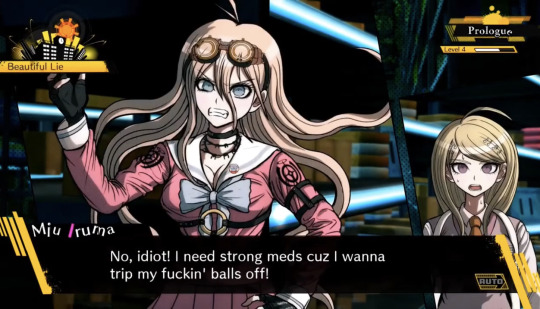
example #3: substance abuse
miu is a drug addict. this is shown by her intro. although it's brief, it gives us a lot of insight about her and what her coping mechanisms are. she uses drugs to try to set her mind free from everything, and wants to get high to avoid her problems. this is extremely common in bpd, and individuals suffering with the disorder are prone to substance abuse as a coping mechanism.
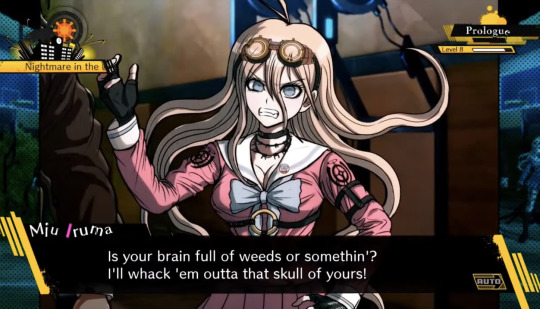
example #4: inappropriate anger and a bad temper
miu has a temper, that's a given. that is something everyone knows about her, and something that everyone points out about her as a character. with bpd, emotions are heightened due to the amygdala (part of the brain responsible for emotional regulation) is shrunk compared to people without the disorder. i will also return to the point about her emotions being heightened later on in this post. but as for her anger, she is an angry person. she gets angry incredibly easily. little things bother her and this is because of heightened emotions.
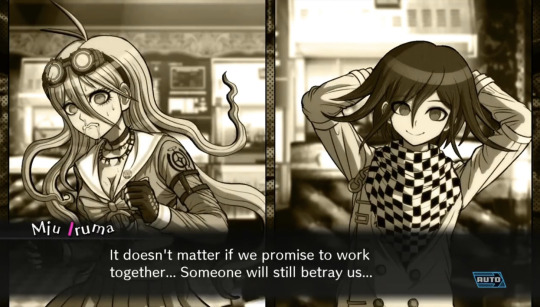
example #5: paranoia
people with bpd can be extremely paranoid, feeling as if the world is out to get them. this is prominent in miu's case as well, she's a very paranoid person. she has extreme levels of distrust that impact her decisions especially through later parts.
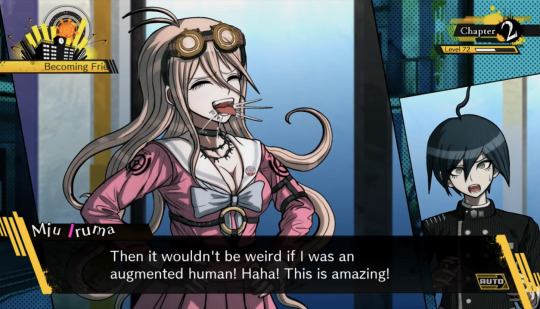
example #6: delusions
delusions are frequent with this disorder. and something that is not well known about miu; she is delusional. due to her car accident and being saved from the surgery, she believes that she is not human. although she seems happy about it, that's what a delusion is. it is extremely unhealthy and later on in the free time event, she tries gutting herself with a wrench to prove her point.
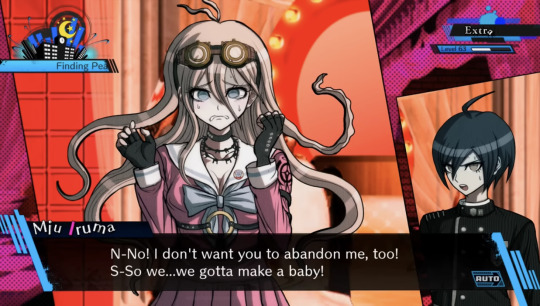
example #7: unstable relationships
please note the ending of this sentence. she makes a note saying she doesn't want him to abandon her "TOO". she has had a history of this. people have abandoned her in the past and left her in the dust. this happens frequently with those who have bpd, that tendency to have unstable relationships with other people. but it is possible for someone with bpd to have a healthy relationship with someone.

example #8: sensitivity and reactivity
this ties back into the point i made before about miu having heightened emotions. another end of these emotions is an overall sensitivity to the world. miu is very reactive. she will take anything as a personal attack and consider someone mad at her for it. she is incredibly sensitive and can cry easily (nothing wrong with that though, part of the disorder). she's very reactive to the world and what people say to her, backing off whenever spoken back to.
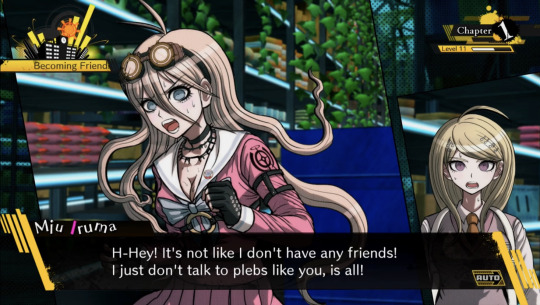
example #9: extreme mood swings
one thing everybody notes about miu's character when first seeing her is how quickly her mood changes. i remember watching gameplays on youtube and youtubers would comment on her frequent and quick mood swings. its an obvious thing and she goes through more mood swings than the average person does. her mood can literally change in seconds. with bpd, emotions are very unstable. due to this, mood swings can happen incredibly often and at high rates. miu can be angry one second, then upset, then confident, all in the span of a few minutes. yes, those are extreme mood swings.
AND THATS ALL I GOT FOR THIS POST! thank you for reading if you stuck all the way to the end of this. as someone with bpd i find extreme comfort in how miu acts because she is so similar to me. i love analyzing her character
#danganronpa#miu iruma#drv3#danganronpa v3#dr#iruma miu#tw drug mention#bpd#borderline personality disorder#analysis#character analysis#danganronpa analysis
20 notes
·
View notes
Text
Idk how hot of a take this is, but i don't really like kokichi's talent. Like ik the whole arguement of "did kokichi lie abt his talent?" has made its rounds around the fandom (i personally dont think it matters whether he lied abt it or not) but i think it shows how unnecessary it is to have kokichi be the supreme leader.
Kokichi is childish and makes frequent mention of the killing game being, well, a game. He mentions video games a few times, and most glaring, he loves to lie. Design wise, his childish appearance is very clear, but his scarf is obviously designed like a chess board. His organization is literally called DICE. Hell, while you can argue he "manipulates" everyone to do his will in ch 4 and 5, nobody liked him well enough to consider him a "leader". He's more a loner rather than leader. A solo player, if you will lol
Literally everything about Kokichi points to him being some kind of Ultimate Chessmaster or Puzzle Expert, something along those lines. And it would completely fit as well. His deductions point to the strategy he would need to win in intellect games like chess or checkers. His lying might be a skill necessary in social games like mafia or card games. His flippant attitude to people (outwardly?) and desire to win makes sense if he's revolved his whole life around defeating his opponents in a game. And it isnt some prestigious position like "strategist", as it still reflects his childish nature.
Hell the only way the dr crew could indicate "supreme leader" in his design is only in his splash art, where they literally try to cover their design up with a hat and cloak to seem convincing.
I get that danganronpa usually likes to subvert their ultimates' personality compared to their talent such as Hiyoko, Gundham, Nagito, Miu, and Tenko to name a few. But Kokichi??? Wow the guy who's been screaming since day one how evil he is ends up seizing control of the killing game im so shocked :000 Like sure he is childish and playful, very unlike a leader, but it's not a significant subversion.
Like it wouldve been more impactful/funnier if the seemingly childish character with a childish talent ended up proclaiming himself as the mastermind.
Tho it can argued it wont be as shocking of a twist when the character who likes winning games ends up proclaiming himself in charge of the killing game. But i think its at least better than the very on the nose supreme leader "talent". Like, to me, it's TOO obvious when kokichi says he's the mastermind that I immediately doubt it. Not to mention that Supreme leader is such a vague talent that aside of kokichi's unconvincing (albeit hilarious) reason of "cuz im evil muahahah very evil trust me" i dont see what more the talent can mean. He wants to rule everything so sure ig he'd wanna rule over this killing game. What else connects to his talent??
At least with a talent like puzzle master or something like that, kokichi taking over can directly correlate with his talent as a motive. Theres more explanation of how games thrill him, and that'd make sense with his talent. He can say how he's tired of playing and finally wants to secure his victory and be the game master. That can double onto his motivation as a life long puzzle solver. It can at least make more logical sense, thus making it slightly more believable that kokichi is really the mastermind, helping the impact when he's revealed as just another player.
There's a little more reverse psychology. It may be obvious he is mastermind material, but there is still room left that he may just be that way due to his talent. When it comes to the Supreme leader talent, it's so vague that there's no room outside of being the mastermind, and honestly, it becomes less of a red arrow and more of an obvious red herring.
Anyway this whole post was me struggling to find another way to not say "ultimate gamer" lol. Aside from chessmaster or puzzle master, i think of much lol. Ultimste Board Game Master lol???
#danganronpa#danganronpa v3#drv3 kokichi#drv3 killing harmony#kokichi oma#danganronpa analysis#hot take
32 notes
·
View notes
Note
What are your thoughts on the fan theory that Makoto has low empathy and is helping people eitherway because it's the right thing to do, whilst Junko has high empathy and is taking people down to Despair because she can partially feel their emotions?
I like that a lot, and I think there's honestly a good amount of support for it in the story and how the themes of hope and despair operate within it.
59 notes
·
View notes
Text
Okay so I'm not as big into Danganronpa as I used to be, however there are some cool fics out there and I've started to think about the characters in a more analytical sense then I used to.
One in particular being Izuru Kamakura, aka Hajime Hinata. The reason I said "aka" is that Izuru is Hajime. Hajime is Izuru. Unlike how some fanfics have portrayed them, they are the same person. Hajime didn't just wake up after SDR2 and he now has Izuru in his head or they're sharing a body or something.
Izuru Kamakura is simply the name an amnesiac Hajime Hinata was given. He didn't object to it because he didn't care, he can't care. He suffers from severe anhedonia (no longer finding pleasure in things you once enjoyed). His emotions are dampened to the point of nonexistence (he still has them because we've seen he cried in the anime).
After the events of SDR2, Hajime isn't going to wake up and be the same person he was in the simulation. His emotions would be dulled, and while the Neo World Program made his emotions be how they normally would, that is not the case anymore. He would feel a disconnect, he would know that he's supposed to be angry or happy in certain situations, but it wouldn't be as full force as it used to be. He might have to force himself to sound or appear a certain way because his mind won't let him. He is both Hajime and Izuru, and his way of thinking, speech, emotions, and behavior would reflect that. Also, if Hajime felt a certain way about someone before the simulation, that emotion would likely persist. Emotions are hard to get rid of entirely, mainly because the body can become conditioned to certain stimuli to produce those emotions. Case in point being Chiaki Nanami. When she died, 'Izuru' cried because she was important to him before. His body knows this and so it reacts accordingly.
Heck I could probably write a whole psychological essay on this man and how emotions and memory work, but I'm busy with school. I just wanted to express some of my thoughts on this guy and the ideas I see certain fanfic perpetuate.
#sorry for the ramble I have thoughts on this man#emissary speaks#hajime hinata#izuru kamakura#danganronpa analysis
16 notes
·
View notes
Text
im undecided if hajimes parents knew about the hope cultivation plan or not
we see on the contract there is a place for parental signatures but hopes peak is also super shady and im sure they couldve just included it on there to give hajime peace of mind
but at the same time theres something so haunting about the idea that hajimes parents signed it
did they read through it and still agree?
did they see it as an opprotunity to make their son happy? or did they want their son to be something great so it would reflect onto them?
or even worse did they just sign it without second thought because they were too busy?
were they where hajimes deep feelings of inferiority start? the idea that he could be something that would captivate their attention.
we never hear anything about hajimes parents looking for him which i feel like would be mentioned in passing at least once if it was something that happened. were they paid off? did they think hajime got expelled and went off the deep end so they stopped caring? was hopes peak so good at cover ups that they managed to convince hajimes own parents he was still alive just so busy he couldnt call them?
theres so many unanswered questions regarding this that it continues to lure me in. it feels like every new piece of writing i create i close my eyes and pick from the list because there are so many options that could all work and still make sense for why hajimes character is the way he is.
it only makes sense that the most guy guy to ever guy has some form of parental trauma
#danganronpa#sdr2#hajime hinata#hes my son now#this question really gets me me#because both choices come with horrifying implications#anyways#this mystery is one of my#favorite pieces of dr writing#super danganronpa goodbye despair#dr3#danganronpa 2#danganronpa analysis
60 notes
·
View notes
Text
I wish there was more focus on Hiro’s brief stint as leader and the tragedy of it all.
When Taka was out of commission from grief, Hiro said he would take over as leader because he was the oldest, but I can’t help but think he must have felt guilty for not doing that from the beginning.
For letting a teenager get crushed under the weight of a burden that Hiro should have taken from the start as the only adult present.
And then Taka was killed and Hiro must have blamed himself. He was the leader, he was the adult, and two teenagers were murdered while he was stuck in a locker.
Hiro must have felt terrible, felt responsible, and felt even worse knowing this is how Taka must have felt when he was the leader.
Hiro let a teenager take the role of leader, watched that kid get crushed under the weight of it all, took responsibility of the group while trying to spare that kid some pain, only to end up getting accused of murdering the very person he was stepping up to the plate to try and protect.
The whole thing was a very sad affair when laid out like that but the game is very flippant about it.
I think it would have been more interesting if this was all taken more seriously. If Hiro was taken more seriously, because when he tried to get serious he thought he couldn’t hack it, and was pretty checked out for the rest of the game.
Can’t say I blame him after all that.
#danganronpa#trigger happy havoc#yasuhiro hagakure#kiyotaka ishimaru#dr1#my post#danganronpa analysis#Hiro tried his best and I appreciate him
89 notes
·
View notes
Note
Makoto’s luck works in a round about way.
Like slipping on a piece of paper and falling on his butt in order to unknowingly dodge the wrench Junko threw at his head.
He’s rarely genuinely unlucky, it just looks like that until those moments of “bad luck” work in his favor.
I agree in a sense. Personally, to me, Makoto’s luck is unique because he doesn’t have a relationship to using it. He doesn’t expect to use it or for it to come through for him. He doesn’t acknowledge it in terms of what could define what makes him a person worthy of HPA or the rest of the world.
To him, the concept of him being lucky is laughable. He’s just a guy. That’s why he’s lucky. It’s his normalcy, his humanity, his sense of the feelings of others around him that throws the wrench in Junko’s plans. Makoto’s luck is never what he will cling to in order to define who he is like Nagito does. He doesn’t wield it effortlessly like Izuru. Because that’s not who he is.
Makoto is defined by his normalcy. The ending theme to the first games says it well “I’m not an honor student, I don’t need an award, as long as I know the kindness of people”. Makoto’s belief in people is his luck. It is his saving grace. It is the wrench he throws at Junko. Thats how we should look at his “luck”.
#danganronpa#danganronpa trigger happy havoc#makoto naegi#danganronpa analysis#sorta…?#thanks for the ask!
55 notes
·
View notes